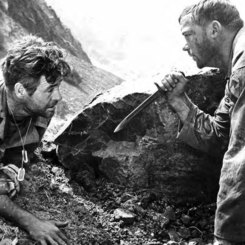Men In War
May 20, 2016
(Anthony Mann, United States, 1957, 35mm, 102 min)
Restored 35mm print!
Following his brutal film noirs for Eagle-Lion and a memorable series of psychological westerns with James Stewart, director Anthony Mann made a brace of adult chamber films for Philip Yordan’s Security Pictures, God’s Little Acre (1958) and Men In War. What All Quiet on the Western Front (1930) and The Story of G.I. Joe (1945) were to the great world wars, Men In War is to the Korean War.
An infantry platoon becomes separated from its division behind enemy lines as their commander valiantly tries to sustain his authority and his men’s morale against seemingly two enemies: unseen Korean snipers and a roustabout sergeant ferrying his injured CO across the war zone. Screenplay credit to Philip Yordan (the alleged model for Sammy Glick) is today believed to be as a front for blacklisted screenwriter Ben Maddow (Intruder In the Dust, 1949; The Asphalt Jungle, 1950). The script transposes Van Van Praag’s World War II novel Day Without End from the French countryside following D-Day, to the onset of the 1950 “police action” in Korea (deployed here amid Los Angeles’ Bronson and Malibu Canyons). The disconnect between battlefield reality and the imperatives of authority is delineated as Robert Ryan’s Lt. Benson clings to his paternal charge over his embattled men while Aldo Ray’s interloping non-com, Montana, worships “The Colonel” (Robert Keith), his shell-shocked CO and father figure, refusing to acknowledge Benson’s command. Montana’s uncannily prescient soldiering runs counter to Benson’s by-the-book protocols. “You’re always right, Montana,” snarls Benson through clenched teeth. Star turns by Ryan and Ray in no way detract from the ensemble acting that is the film’s core.
Men In War presaged the disillusionment over the Vietnam conflict in the 1960s, making it unsurprising that the United States Army deemed the film offensive to “the dignity of commissioned and non-commissioned officers.” It was a failure in Eisenhower’s America but a success in post-war Europe where the fable was intrinsically understood.
--- Scott MacQueen
